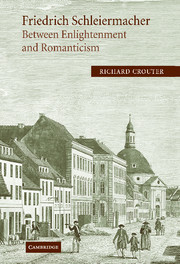Book contents
- Frontmatter
- Contents
- Acknowledgments
- List of abbreviations
- Introduction
- PART I TAKING THE MEASURE OF SCHLEIERMACHER
- PART II SIGNPOSTS OF A PUBLIC THEOLOGIAN
- 5 Schleiermacher's Letters on the Occasion and the crisis of Berlin Jewry
- 6 A proposal for a new Berlin university
- 7 Schleiermacher and the theology of bourgeois society: a critique of the critics
- PART III TEXTUAL READINGS AND MILESTONES
- References
- Index
6 - A proposal for a new Berlin university
Published online by Cambridge University Press: 14 January 2010
- Frontmatter
- Contents
- Acknowledgments
- List of abbreviations
- Introduction
- PART I TAKING THE MEASURE OF SCHLEIERMACHER
- PART II SIGNPOSTS OF A PUBLIC THEOLOGIAN
- 5 Schleiermacher's Letters on the Occasion and the crisis of Berlin Jewry
- 6 A proposal for a new Berlin university
- 7 Schleiermacher and the theology of bourgeois society: a critique of the critics
- PART III TEXTUAL READINGS AND MILESTONES
- References
- Index
Summary
It may surprise English-speaking specialists in modern religious thought to discover that in Germany the name Friedrich Schleiermacher resonates so strongly within the fields of educational theory and practical pedagogy. As a theologian-educator reflecting on the nature of a university, his work compares with John Henry Newman's The Idea of the University in Great Britain and the US. Hundreds of German monographs, papers, and conferences testify to Schleiermacher's contributions to Pedagogik. Among these works, Occasional Thoughts on the Universities in the German Sense became a standard text on universities in its author's lifetime, even if today it is more often cited than studied in depth. Schleiermacher's contribution to founding the University of Berlin is virtually without precedent. Few professors have lectured at a university, the ethos and structures of which they had shaped so formatively. In hindsight we can see that Occasional Thoughts is a pivotal document in his intellectual biography; it drew from all that preceded, even as it shaped his subsequent career. It is ironic that one of Schleiermacher's most accessible and relevant treatises should be examined so infrequently.
If we have generally not thought of Schleiermacher as the maker of institutions, perhaps out of a mistaken sense that romantics do not do that sort of thing, the time is ripe to think differently. Theodore Ziolkowski has compellingly argued that the energies unleashed by the Romantic movement contributed to institutional life in fields that include mining, the law, insane asylums, and museums, in addition to universities.
- Type
- Chapter
- Information
- Friedrich Schleiermacher: Between Enlightenment and Romanticism , pp. 140 - 168Publisher: Cambridge University PressPrint publication year: 2005



